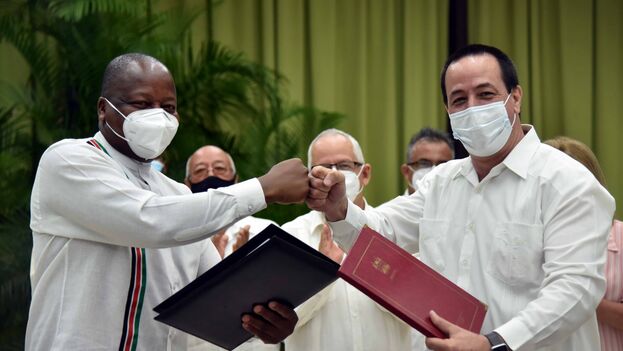
![]() 14ymedio, Madrid, 22 March 2023 — Kenyan doctors who complete their training in Cuba “live in deplorable conditions,” according to the Union of Doctors, Pharmacists and Dentists of Kenya (KMPDU), which has placed approximately 50 residents in Cuba, who are currently studying a specialty.
14ymedio, Madrid, 22 March 2023 — Kenyan doctors who complete their training in Cuba “live in deplorable conditions,” according to the Union of Doctors, Pharmacists and Dentists of Kenya (KMPDU), which has placed approximately 50 residents in Cuba, who are currently studying a specialty.
The message was heard even louder in the Health Committee of the Kenyan Senate on Tuesday, where the secretary general of the organization, Davji Bhimji Atellah, said bluntly: “Kenyan doctors in Cuba are suffering.”
There were no more specific details about the complaint, whose objective is to put an end to the agreement that the governments of both countries have maintained since 2017, and according to which Cuban doctors occupy several vacant positions in hospitals in Kenya, and Kenyan medical students go to Cuba to train. The agreement expires this June, and the union demands that it not be renewed.
However, the claim is not something new. In 2019, when the situation on the Island was far from the critical state it is in now, the same union denounced the suicide of one of its students, Ali Juma Hamisi, which friends in Kenya attributed to the “terrible living conditions” that he complained about in his calls.
Among the most frequent complaints was the poor quantity and quality of the food. In addition, the money provided to cover the doctor’s expenses was slow to arrive or never did, and it turned out to be negligible compared to the cost of living in Cuba. Also, the tickets to travel home once a year were canceled. The lack of air conditioning in the heat and the uncomfortable rooms did the rest.
It can be assumed, although Atellah did not say it, that these bad conditions are the currently same, and even worse. The trade unionist explained in the House that the agreement turned out to be a “waste of human resources,” and he pointed out the case of those who have already returned.
“After the training in Cuba, they returned to Kenya and had to undergo two years of training here for the Medical Council to authorize them to practice as family doctors. The scope of the practice of family medicine in Kenya is different from the Cuban one; hence the need to train doctors, so that they acquire skills that allow them to practice,” he said.
The same applies to the reverse case. “Cuban doctors who came to Kenya also faced challenges. The expectations were different. A family doctor trained here can perform emergency obstetric and gynecological surgeries, as well as surgical emergencies. Cuban family doctors are not prepared to do surgeries because it is not part of their training,” he added.
To all this is added the language barrier, in both cases.
Atellah has asked for an audit to analyze the cost-benefit of the program, which, in his opinion, is not positive.
“Cuban doctors are in the Kenya School of Government at the expense of taxpayers instead of being in hospitals, while there are about 100 unemployed Kenyan family doctors who could be incorporated into primary care,” he said.
According to the trade unionist, the counties have also taken care of accommodation and provide them with a driver and security that local doctors do not have. In addition, he said, they receive three times the salary of Kenyans. He omitted, however, that this money is not paid individually to each worker, but to the Government of Cuba, which gives the doctors themselves a minimum percentage, as has been denounced on numerous occasions.
The health agreements between Kenya and Cuba led to the kidnappings on April 12, 2019, of the surgeon Landy Rodríguez Hernández and the specialist in general medicine Assel Herrera Correa by alleged members of the Somali jihadist group Al Shabab, while they were on their way to work in the hospital in Mandera, in the northeast of the country.
After four years, the triangulated negotiations between the governments of Cuba, Kenya and Somalia were unsuccessful in freeing the two doctors. On two occasions they were close to success, the first only a month later, when traditional leaders of the area traveled to negotiate and were offered the prisoners in exchange for a payment of 1.5 million dollars, according to the local press.
In October 2020, the release of the doctors was announced by different press agencies, which cited a senior official of the Somali intelligence services as a source. Hours later, he explained that the delivery of the two hostages had been frustrated at the last moment after a “filtration” paralyzed the “safe transfer.”
Translated by Regina Anavy
____________
COLLABORATE WITH OUR WORK: The 14ymedio team is committed to practicing serious journalism that reflects Cuba’s reality in all its depth. Thank you for joining us on this long journey. We invite you to continue supporting us by becoming a member of 14ymedio now. Together we can continue transforming journalism in Cuba.
